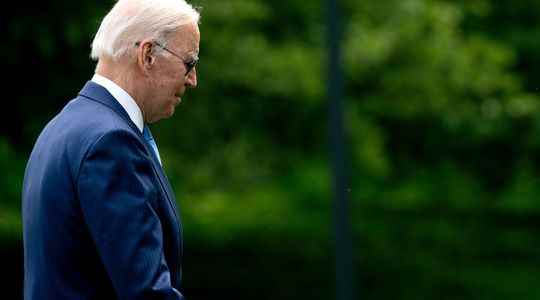Operation seduction between Seoul and Tokyo. Initiated by the new conservative South Korean president Yoon Suk-youl, this new phase aims to put an end to the diplomatic tension which reigned under his predecessor, Moon Jae-in. This warming can only delight Joe Biden, visiting the two allies of the United States in East Asia from May 21 to 24. On a war footing since the Russian invasion of Ukraine, the tenant of the White House wants to affirm the American presence in the region, and push for the creation of a united front in the face of Chinese and North Korean threats. And this, while Pyongyang could launch missiles or even a new nuclear test during his visit.
Signs of rapprochement between Japanese and South Koreans have multiplied since Yoon’s election in March. Between the vote and the investiture of May 10, the applicant entrusted foreign affairs to Park Jin, known to have his entries in Tokyo. He also appointed as new ambassador to Japan Yun Duk-min, a former director of the Korean diplomatic academy, a graduate of Japan’s Keio University and speaking Japanese, who believes it is possible to “resolve the existing difficulties”. Yoon’s diplomatic adviser before he took over as president, he has already met Japanese Prime Minister Fumio Kishida.
Historical wounds and economic disputes
Initiatives well received in Tokyo, which responded by sending a large delegation to Yoon’s inauguration. However, the construction of bilateral relations promises to be difficult. Moon’s five years in office have seen bickering over historical issues escalate into economic wrangling. Unheard of since the establishment in 1965 of diplomatic ties between Japan and its former colony (between 1910 and 1945).
As soon as he came to power in 2017, Moon denounced the 2015 agreement that “finally and irreversibly” resolved the issue of so-called “comfort women”, forced into prostitution for Japanese soldiers during the Second World War. Then South Korean courts condemned Japanese companies, such as Nippon Steel, to compensate the Koreans forced to work for them during this conflict. The Japanese responded with trade sanctions. South Korea has declared a boycott of Japanese products and threatened to withdraw from an agreement on the sharing of military intelligence.
These bickerings have reduced exchanges to a bare minimum, to the despair of Washington worried about the rise of China, “the greatest geopolitical challenge of the 21st century” according to Secretary of State Anthony Blinken. Yoon seems determined to improve the situation in order to give his country a “fresh start” – at the risk of offending China, which Moon was sparing – by anchoring it more strongly to the new security architecture of the Indo-Pacific, where Japan occupies a central place. Ready to “positively analyze” a rapprochement with the Quadrilateral Dialogue for Security (Quad), a structure bringing together Americans, Japanese, Indians and Australians, he also wants to participate in the Indo-Pacific Economic Framework designed against Chinese expansionism, and that Antony Biden, the head of American diplomacy, must launch from Tokyo. Its minister Park Jin even pleads for a rapprochement with the Aukus (a three-party military alliance: Australia, the United States and the United Kingdom).
Reluctance of public opinion
The summit with Biden should comfort Yoon. “Biden and Yoon will work to undo some of the damage to Seoul-Tokyo relations by making positive statements about trilateralism and the need for allies to unite in the face of serious and growing threats in the region,” predicts Victor. Cha, from the Center for Strategic and International Studies (CSIS).
The success of these plans will, however, depend on the ability to overcome the reluctance of public opinion. South Koreans remain suspicious of the former colonizer, and in Japan, rapprochement with South Korea is not easy. Prime Minister Kishida wanted to attend Yoon’s inauguration. The influential conservative faction of the Liberal Democratic Party (PLD in power) dissuaded him. She considered the initiative premature. Biden will have to redouble his efforts to ensure that the momentum between the two countries does not wane.
